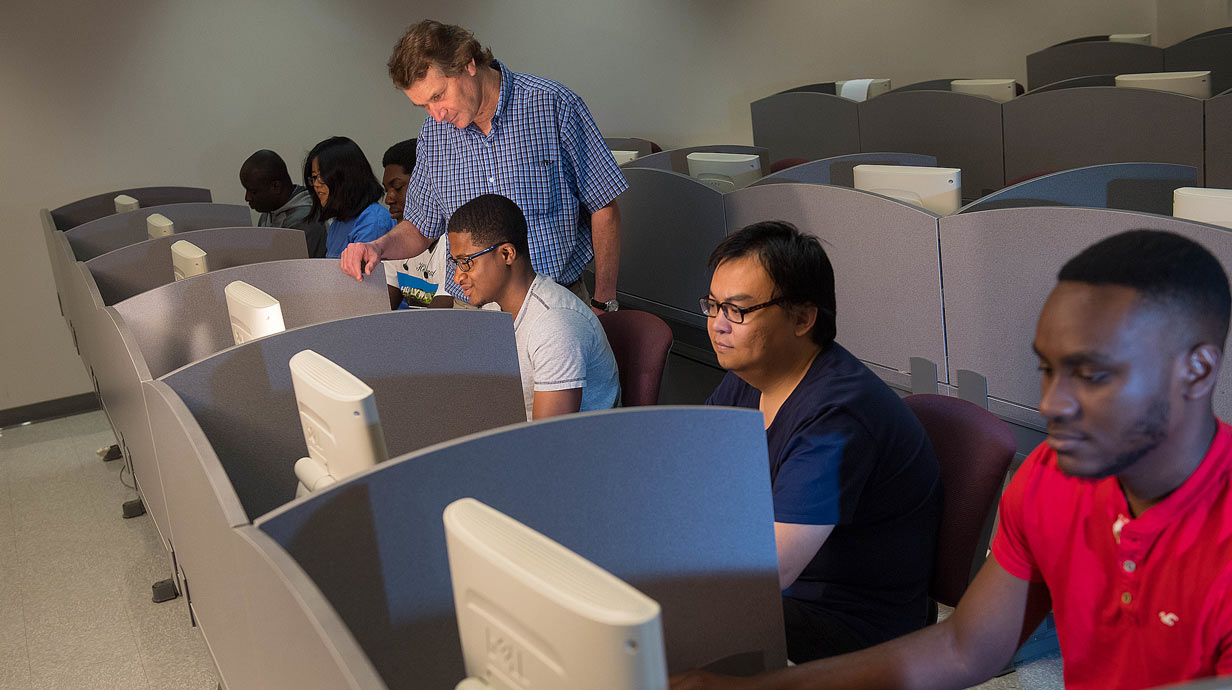Economics, Ph.D.
Gain technical skills and advanced understanding of markets, government policy, and institutions to prepare for research careers in higher education, industry, or government.

About the Ph.D. in Economics
The Department of Economics in the College of Liberal Arts offers the Ph.D. in Economics. It is designed for students of exceptional ability who wish to do advanced work in preparation for careers in university teaching and research, or as specialists in business, government, or research organizations.
The course of study is more expansive in scope and is of greater depth than the master’s program, with programs individualized to fit each student’s interest and background.
On this Page…
Program Information
Degree
Ph.D. in Economics
Required Credit Hours
54
Program Type
Doctorate Program
Program Location
School
Duration
4 years
Ph.D. in Economics Program Details
Learn about the application process, academic requirements, financial support, and the facilities available to you.
APPLICATION DEADLINE: March 1
The Department of Economics welcomes student applications.
- Complete the Graduate School’s Online Application.
- Upload Supplemental Application materials for the Department of Economics to the online application.
The Graduate School requires a minimum 3.0 undergraduate GPA. The Department of Economics welcomes students from any academic background, but expects students to be prepared for the rigors of graduate study in economics. When the Admissions Committee reviews an applicant’s transcript, it looks at the overall performance and specific performance in economics or economics-related courses and quantitative courses (math, statistics).
Students in the Ph.D. in Economics complete at least 54 credit hours of graduate courses beyond the bachelor's degree or at least 30 approved graduate hours beyond the master's degree.
Students must meet the core requirements for the M.A. degree:
- Econ 604: Applied Statistical Techniques in Econ (or 629 Statistical Methods for Economics)
- Econ 605: Microeconomics I
- Econ 606: Macroeconomics I
- Econ 609: Mathematics for Economists
Ph.D. students select two subfields chosen from applied microeconomics, applied macroeconomics, or econometrics. One subfield may be in an approved area outside economics.
They complete the following courses:
- Econ 614: Microeconomics II
- Econ 628: Macroeconomics II
- Econ 629: Statistical Methods for Economics
- Econ 630: Econometrics I
- Econ 631: Econometrics II
- 9 credit hours in subfield 1
- 9 credit hours in subfield 2
Each student must successfully pass a written examination in economic theory and econometric methods during the spring semester of the second year in the program.
After passing the comprehensive exams, students must successfully defend a dissertation proposal. After the dissertation is written, a final oral defense culminates the student's doctoral program at the university.
All our Ph.D. students receive an assistantship. Assistantships require the student to work as a teaching/research assistant to departmental faculty, or as a graduate instructor.
Students with a graduate assistantship receive
- scholarship that covers some or all of the tuition and non-residency fee, if applicable, for regular semesters, and
- subsidized health insurance.
To learn more, visit the Graduate Program webpage for the Department of Economics.
The Graduate School's financial aid webpage lists a variety of funding possibilities.
The Mississippi Experimental Research Laboratory (MERL) is a computerized research facility used by faculty and graduate students to conduct a wide variety of economics research, including experimental economics, econometrics, and microeconomics.
The university also has the Mississippi Center for Supercomputing Research.
Department of Economics
Department Video
Hear firsthand from students, faculty, and staff about the Economics program.
Next Steps
Explore Affordability
We have a variety of scholarships and financial aid options to help make college more affordable for you and your family.
Apply to the University of Mississippi
Are you ready to take the next step toward building your legacy?
